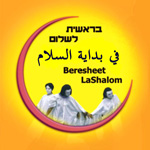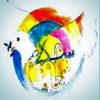TRAVELING FOR BREAD
On the Happening “Bread for Peace”
which took place this week.
by Rachel Clein
From Alon Kibbutz Sasa, the Bulletin of Kibbutz Sasa
Friday, June 3, 2005.
We left at six thirty Wednesday morning on our way to Bethany-Azariyyah,
with stops to collect passengers on the way. With us were people
from all the area: Dalton, Bar’am, Gush Halav and other places –
nearly a full bus.
The purpose of this meeting between Israelis and Palestinians was to
get acquainted and to undergo a common experience, with no political
overtones. Peace is not a political issue, but a matter of humanity.
This was a chance to meet people who live far away from us, with
opinions that are perhaps very different from ours; but what was
common in the meeting was the baking of bread, spending time
together, and mutual respect.
During the bus ride Edna Calo-Livne’s cell phone did not stop
ringing. There were calls from people here and abroad. Radio
broadcaster Tali Lipkin-Shahak also called and interviewed Edna live
on her program. Many journalists were present at the event itself –
Arabs, Italians and others. Hayyim Yavin was there too, but as a
private person, not as a representative of the Israeli media.
On our arrival we were welcomed by the teen-age boys of the village,
dressed in Scout uniforms, with drums and cymbals. Women came to us
to shake hands. After that there was a ceremonial exchange of gifts:
we gave them baskets of fruits, and decorative sheaves of wheat
stalks designed by Roby Cohen, and they gave us olive branches.
After the ceremony we went to the place of the event – the bakery,
beside which a tent had been set up. Samar, Edna’s partner in
organizing the event, is the director of an orphanage in the
village, and of a shelter for battered women as well. The bakery
also belongs to the shelter, and supplies work for the women. During
the short program there were speeches and greetings in all the
languages, and there were performances: a musical group with two
instrumentalists and a female singer; a portion of the show
“Beresheet” by Edna’s troupe; a liberation of live doves; and also
an attempt to sweep the crowd into communal dancing, with only
partial success.
The organizing of everything was perfect. We kept to our schedule,
despite the stops at the numerous collecting-points, and everything
that had been planned was carried out. Also the parallel events that
were supposed to be held in Italy were carried out, and fresh
reports from the locales there reached Edna’s cell phone during the
ride home.
Edna’s energy and enthusiasm, and the cooperation between Edna and
Yehuda, are deserving of the highest appreciation. It is true that
when we got off the bus I heard Edna say, “I’m tired,” and maybe
that was the first time I’d heard those words from her mouth; but in
my opinion events such as this one are extremely important, and it
takes courage, determination and strong faith to carry them out in
the troubled atmosphere prevailing in our country.
The important thing in my eyes was the participation of people of
different ages, on both sides. The older people on both sides of the
barrier are fixed in their opinions, and each side is convinced it
is right; but what gives a spark of hope is the teen-agers and
children participating in such meetings and getting to know each
other. And all this thanks to the activity of Edna and Yehuda. All
that remains is for me to say to them “Well done!” on their
contribution to society. I am proud that there are such people among
the members of my kibbutz.
A vibrant, and attractive Israeli woman born in Rome is capturing
the hearts and souls of Italians. Her name is Edna Angelica Calo
Livne and since the day in 1975 when she explained her imminent
aliya to a packed auditorium of Roman Jewry, she has been living in
Kibbutz Sassa.
Angelica and her husband
Yehuda devote their lives to reaching out to children - children of
kibbutzim; Israeli child victims of terrorism (bringing them
periodically on vacations to Italy through Yehuda's beresheet Le
Shalom Foundation); and Christian, Muslim, Druse and Caucasian-Circassan
children of Kibbutz Sassa's neighboring villages on the
Lebanese-Syrian border. These children are the actors of the Rainbow
(L'Arcobaleno) Theater productions, which focuses on pantomimed
dance, and expressing emotions through body language.
"Beresheet" and "Anne in
the Sky" are two of the latest productions performed at the Venice
Film Festival and in Rome during the September Week of Jewish
Culture. A two minute trailer of an animated three-dimensional Anne
Frank film with Anne's true face digitalized and superimposed, to be
completed in 2006, was also shown. The audiences, coached into
conversing with the actors after performances, were visibly moved.
"Beresheet" enacts the
eternal cycle of birth, war, death and renewal. Masked actors begin
as a formless mass of orange versus fuscia, clashing to the point of
near annihilation until they begin to touch and love each other.
Only then are all but two of the masks removed, because "some people
will always be unreachable", says Angelica. . .
"Anne in the Sky," is a freely interpreted Diary of Anne Frank,
conceived and written by Angelica Cal and Roberto Malini . While one
Anne writes at a desk, another dances the story, and yet another
off-stage girl's voice recites a selection of Anne's thoughts,
attesting to her great talent and humanity - the Anne that became
"the mother of all children" in Bergen-Belsen, the Anne "that would
have become a great writer had she been permitted to live."
Then comes the knock on the
door - masked and rigid SS officers. Auschwitz is projected onto the
screen. A sudden interruption and the children reappear, clothed in
white, entering like snowflakes. They confide their dreams to the
audience - "to find a cure for cancer," "to become a midwife," "to
build a house."
The knocks are heard again,
but this time Anne's voice commands, "No. Don't open the door. We
will not open the door."
The play is dedicated "to
Anne Frank and to all children who live in places where it is still
difficult to dream."
"We couldn't restrict it to ourselves," said Angelica in an
interview with The Jerusalem Post. "In addition to Jews the Shoah
exterminated gypsies, homosexuals, the mentally and physically
infirm, Christians, even Muslims. Anne's words of hope and belief in
humankind are universal."
Angelica recalls how her
Arab students told their families the story and came back saying
"It's beautiful. But is it true? Who was Hitler and what was the
Shoah?" Angela explained and then they said "We hope this never
happens again. We are happy to be part of this mission."
Angelica's message wells up
from inside her. In one breath she conveys a myriad of emotions: her
untarnished faith in Israel 's founding ideals, ("After Yom
Hazikaron commemorating the 20,000 victims of all our wars, my
stomach churns. But in the evening we all dress in white to welcome
Yom Hatzmaut, a gift of hope to our children"), her passion for
peace that transcends politics ("We don't want this war! I tell you,
take everything you want so long as you let us live in peace") her
fears, ("We need the [security] fence because we have the right and
duty to defend our children. Both Jews and Arabs become victims of
bus explosions") and her deep identification with the Shoah, ("When
I saw the heaps of hair in Maidanek, I was right there with them").
|



